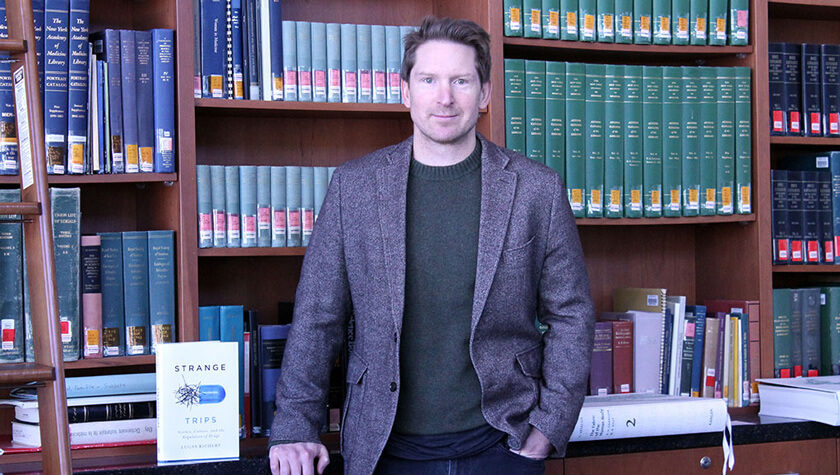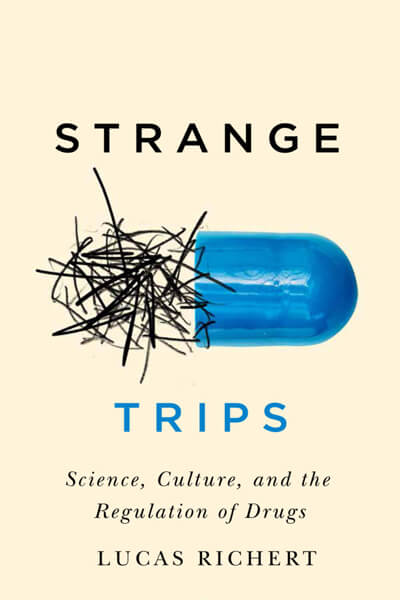
6
June

Associate Professor Luc Richert shares insight on his latest book about the evolving perceptions of drugs
By Katie Gerhards
When do drugs lose their legitimacy, and when do illegitimate substances find their way into popular use? Lucas Richert, associate professor in the University of Wisconsin–Madison School of Pharmacy’s Social and Administrative Sciences Division and George Urdang Chair in the History of Pharmacy, seeks to provide context for these questions and raise a few more in his newly published book, Strange Trips: Science, Culture, and the Regulation of Drugs.
Also the author of the 2014 book Conservativism, Consumer Choice, and the Food and Drug Administration During the Reagan Era: A Prescription for Scandal, Richert has been researching and writing this investigation of the myths, mores, and meanings of drug regulation since 2015. His research sketches not only the complicated past of now-illicit substances, but also highlights the roots of the anti-vaccine movement and how it relates to consumer choice, the proliferation of information, and what constitutes “science.”
What motivated you to write Strange Trips?
I think there needs to be deeper reflection about drugs that are both “good” and “bad” and how the very same substances can be interpreted in different ways depending on the economic and political climate. There’s a lot of stigma surrounding certain drugs, such as cannabis and LSD. If we go back just 50 years, we can trace the stigma being created for variety of reasons. In the 1950s, LSD was perfectly fine in medical settings, but by the 1960s and ‘70s, some people started thinking it would lead to revolution so it needed to be classified as a Schedule I drug to make it less available. (Also there simply wasn’t enough evidence for LSD use as a medicine.)
Some of the drugs we presently think of as horrible have previously been thought of as legitimate medicines, so the point of Strange Trips is to unpack the way drugs can be both legitimate and illegitimate, legal and illegal, and it often depends on the time frame you’re focused on.

Q: Who should read this book?
Anyone — pharmacists included — who is trying to get a sense of a complex health care system, trying to understand the decision-making involved in their own health, or their kids’ or parents’ health.
In addition to the regulation of drugs, part of the book is also about how we make decisions about what we put in our bodies to help our health, including diets, diet pills, and even vaccines.
Where does the information come from that we use to make those decisions? For example, as a celebrity, Jenny McCarthy has a platform with a massive audience where she started pushing anti-vaccination ideas. She said that her science didn’t have anything to do with the British Medical Journal, didn’t have anything to do with the American Medical Association, didn’t have anything to do with “fact.” Her science was the research she did on her own on the internet and how she looked after her son. That was her science. And so, when I write about science in the book, I recognize that it’s something that’s negotiated by all sorts of different cultural factors and influences, ranging from peer-reviewed studies to Jenny McCarthy.
Q: What other topics and figures are in the book?
Some of the things I’m most proud of in the book are the character studies. There have been some really interesting people involved in the regulation of drugs, including a lot of celebrities. Steve McQueen, for example, got cancer in 1977 and was told by his doctors that it was inoperable. He didn’t know what he should do — he just didn’t want to die! He had the resources at his disposal to uncover and pursue a bunch of alternative options, including underground drug treatments. He took a “strange trip” down to Mexico to undergo some super radical treatments, and even though he had the money and opportunity to get a variety of treatments, he still died of cancer in 1980.
Despite his celebrity status, he is representative of the everyday person who goes through health problems and has to make extremely difficult and costly decisions to try to stay alive.
Q: If people read and love Strange Trips, what else do you recommend?
- Vaccine Nation, by Elena Conis, because it gives us a sense of how we got to this point of contention about the legitimacy of vaccines (in the U.S.).
- The AIDS Conspiracy: Science Fights Back. The author, Nicoli Nattrass, is a professor in South Africa and she talks about how people have been resisting the science about HIV/AIDS for far too long.
- Fear and Loathing in Las Vegas. Author Hunter S. Thompson and illustrator Ralph Steadman convey how Americans have enjoyed different illicit drugs in the 1960s and ‘70s, which provides valuable social context to think about regulatory issues.
Q: What’s next?
I have another book due out in October, Break on Through: Radical Psychiatry and the American Counterculture, focused on mental health and psychiatry from the end of the 1960s through the ‘70s. It builds on the same ideas in Strange Trips and deals similarly with the intersection of scientific and cultural imperatives and how we think about mental illness. It delves into some of the wilder mental health treatments that have popped up as well as the present use of MDMA in therapeutic contexts.
After that, I have one more book on my plate called Cannabis: Global Histories, which is about the history and medical applications of marijuana, as it teeters on the edge of legalization in the U.S., which I plan to release in 2020.
Learn more about Associate Professor Lucas Richert’s work in the School of Pharmacy in the history of pharmacy.




